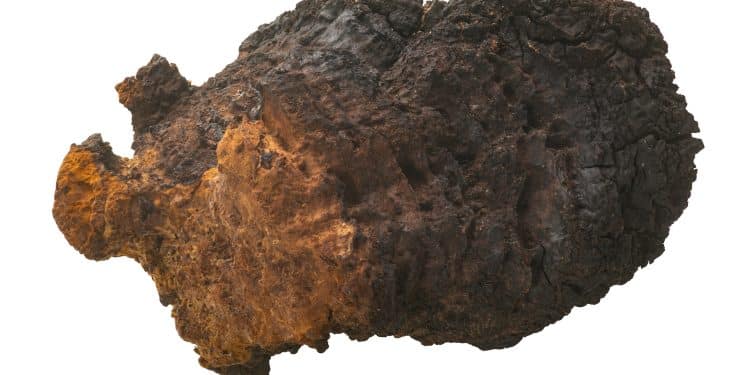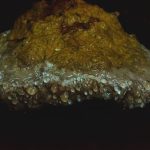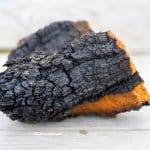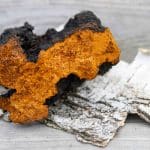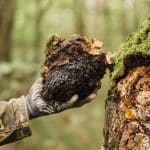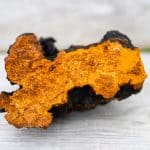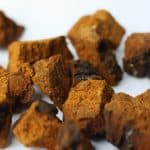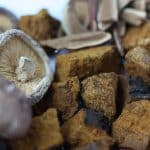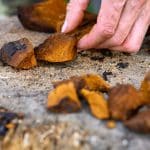Dog owners often explore natural supplements to enhance their pets’ health, and the question of can dogs eat chaga mushroom is a topic of interest due to its potential benefits. While humans consume this fungus for its purported medicinal properties, the safety and effects on canine well-being remain less clear-cut. They must consider the lack of extensive research regarding dogs and chaga mushrooms before introducing it into their pet’s diet. Ensuring that any new addition aligns with a dog’s nutritional needs is crucial; hence, consulting with a veterinarian stands as an essential step in safeguarding their health.
Understanding Chaga Mushrooms and Their Properties
Chaga mushrooms are not your typical fungus. They grow on birch trees and have a distinct appearance. Unlike the common mushroom species, chaga does not resemble an umbrella but more like a dark clump of dirt. This is due to its high content of melanin, which gives it a unique black exterior. These mushrooms boast a variety of bioactive compounds. Among them are potent antioxidants that fight cellular damage in the body. Antioxidants help maintain health by neutralizing harmful free radicals. Another key component found in chaga is beta-glucans, known for their role in supporting the immune system.
Dog owners often explore different types of natural supplements to promote their pets’ health. They look at various properties these substances may offer—like increased energy or immune support—and weigh them against any potential risks or changes they might cause in their dogs’ bodies:
-
Antioxidants;
-
Beta-glucans;
-
Melanin.
It’s crucial to remember that although some foods beneficial to humans also provide advantages for dogs, others can be harmful despite being healthy for people. Therefore, understanding how specific types interact with a dog’s body is essential when adding new elements to their diet.
Safety Profile of Can Dogs Eat Chaga Mushroom
Chaga mushrooms have gained popularity due to their health benefits. However, dog owners should exercise caution. No widespread studies confirm the safety of chaga mushroom consumption by dogs. This lack of research makes it difficult to understand potential risks fully. Some dogs might experience allergic reactions or intolerance to chaga mushrooms. Symptoms can include gastrointestinal upset, itching, or respiratory issues. These effects vary from one dog to another based on size, breed, and overall health. Before adding chaga mushrooms to a pet’s diet, consulting with a veterinarian is crucial. They can provide tailored advice considering the dog’s medical history and dietary needs.
Potential Risks of Feeding Dogs Chaga Mushrooms
Dog owners should be aware that chaga mushrooms can carry risks when fed to their pets. One such risk involves the mushroom’s source. If chaga is harvested from polluted areas, it may contain toxic substances. These harmful compounds could potentially lead to poisoning or long-term health issues in dogs. Another concern lies in the bioactive compounds found in chaga mushrooms. While these substances have beneficial properties, they might also interact with medications a dog is taking. This interaction can cause unintended side effects or reduce the effectiveness of prescribed drugs:
-
Risk of contamination with toxic substances;
-
Possible medication interactions due to bioactive components;
-
Over-supplementation dangers.
In addition to these concerns, there’s also the danger of over-supplementing a dog’s diet with chaga mushrooms. This practice can lead to adverse health effects as too much of any supplement may disrupt a pet’s nutritional balance and overall well-being. Dog owners must consult their veterinarian before adding new supplements like chaga mushrooms to their pet’s diet. They should ensure that it does not conflict with existing treatments or dietary needs.
Health Benefits of Chaga Mushrooms in Canine Nutrition
Chaga mushrooms may offer health benefits for dogs, much like they do in human health. They are known to support immune function. This could make them beneficial for dogs that need an immune boost. These fungi contain compounds that help fight inflammation. Inflammation is linked to many chronic diseases in canines.
The antioxidant properties of chaga mushrooms are significant. They could help protect cells from damage caused by free radicals. This cell protection is crucial as it might reduce the risk of certain illnesses over time. When asking, can dogs eat chaga mushroom, owners should note these potential health benefits when considering canine nutrition and wellness. Another talking point focuses on digestive health and liver support provided by chaga mushrooms. A healthy digestive system is vital for overall dog wellness. Chaga’s fiber content supports good gut function and nutrient absorption. It also helps maintain healthy blood sugar levels, which is important for dogs with diabetes or weight issues.
While research into the use of chaga mushroom specifically for cancer treatment in dogs is limited, its use in humans has been more extensively studied, suggesting some potential applications in veterinary medicine as well. Dog owners interested in natural supplements often seek foods that promote longevity and vitality for their pets. Incorporating elements like chaga mushroom into a dog’s diet could potentially aid these goals when used correctly and under veterinary guidance.
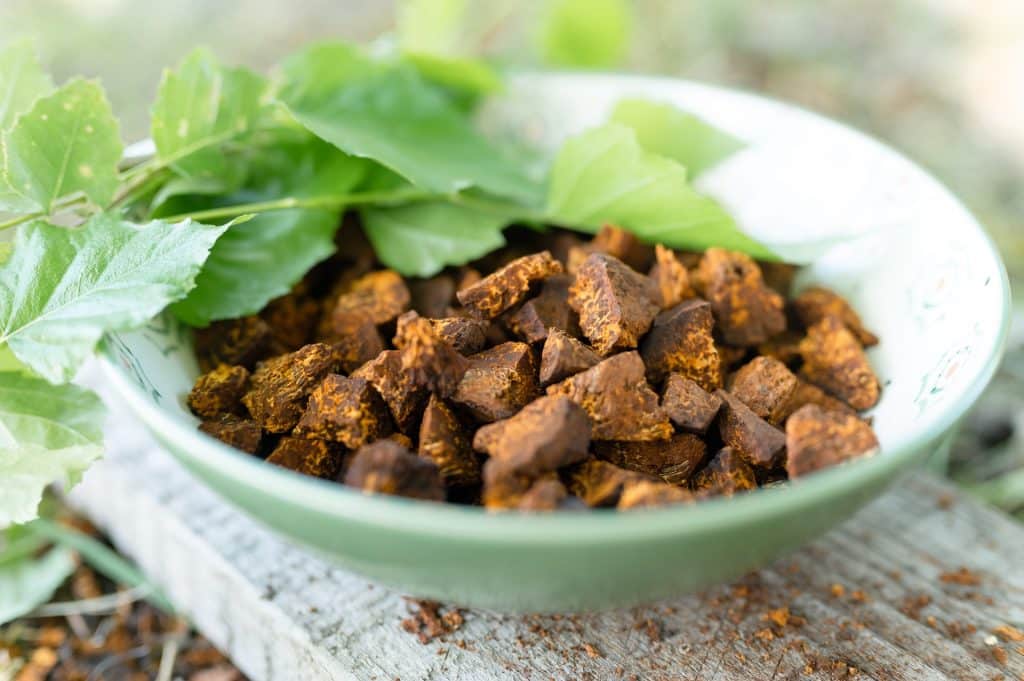
Scientific Evidence Supporting Chaga for Dogs
While Chaga mushrooms are known for their health benefits in humans, the scientific evidence regarding their effects on dogs is sparse. Research that exists is mostly geared toward human or laboratory studies rather than veterinary applications. This lack of direct research leaves many dog owners wondering about the potential benefits and risks associated with feeding Chaga to their pets.
Pet owners have shared anecdotal reports claiming positive outcomes after administering Chaga to their dogs. They suggest it may help bolster immune systems and improve overall health. However, these personal accounts do not equate to scientific validation due to the absence of controlled studies. The effects observed by pet owners require rigorous testing under scientific conditions before they can be considered factual. Existing research primarily focuses on:
-
In vitro applications;
-
Human subjects;
-
Perceived immune system support;
-
General health improvements in pets.
It is important for dog owners to exercise caution when considering unverified treatments for their animals, such as Chaga mushrooms. While some substances like Chaga might be a rich source of nutrients for humans, the same effect may not translate directly to pets such as dogs or cats. For instance, certain compounds beneficial to humans can sometimes produce adverse reactions in animals due to differences in metabolism. When it comes to the question of can dogs eat Chaga mushroom, it’s essential to prioritize the safety and well-being of our furry companions by consulting with a veterinarian before introducing any new dietary supplements.
Moreover, while some studies indicate that components found in Chaga could slow down growth in cancer cells, this has been observed mainly in lab settings and not necessarily within an animal’s body. Trace amounts of bioactive ingredients might also differ significantly between products made for human consumption versus those tailored specifically for animals.
Guidelines for Using Chaga Mushrooms with Dogs
When introducing chaga mushrooms into a dog’s diet, starting with small doses is crucial. This allows owners to observe how their pet reacts. Some dogs may be sensitive or allergic to new supplements. By beginning with a minimal amount, any adverse reactions can be identified early on. Owners should watch for signs of discomfort or allergic reactions, such as itching or gastrointestinal upset.
It is also vital to ensure that the chaga mushroom source is safe and uncontaminated. Wild-harvested mushrooms can carry harmful pathogens if not properly processed. When considering can dogs eat chaga mushroom, owners must prioritize their pet’s safety and well-being. To do so, they should purchase chaga from reputable suppliers who guarantee clean and correctly processed products. This reduces the risk of exposing pets to toxins and potential health hazards associated with contaminated mushrooms.
Recommended Dosages for Chaga Supplementation in Dogs
Determining the right amount of chaga mushroom for dogs is crucial. Dosage should vary based on the dog’s size, age, and overall health condition. Small breeds require less, while larger breeds may need more. Younger and healthier dogs might metabolize supplements differently than older or health-compromised canines. It is vital that owners consult with a veterinarian to establish a safe dosage tailored to their pet’s specific needs.
Overdosing on can dogs eat chaga mushroom can cause unwanted side effects such as gastrointestinal upset or allergic reactions. To avoid these risks, adherence to recommended amounts cannot be overstated. Owners must ensure they are not exceeding the advised dose, particularly when first introducing chaga into their dog’s diet. The frequency of chaga supplementation also plays an important role in its efficacy and safety for canine consumption. A professional, like a vet or a canine nutritionist, should determine how often this supplement should be given to maintain optimal health benefits while minimizing potential harm.
Final Remarks
Dog owners seeking to enhance their pet’s health with natural supplements may consider chaga mushrooms, given their rich nutritional profile and potential benefits. However, it is imperative that they approach this option with caution, recognizing the possible risks and adhering strictly to recommended dosages. The scientific evidence suggests a measured degree of support for the use of chaga in canine diets, yet further research is essential to fully understand its implications. For those electing to incorporate can dogs eat chaga mushroom into their dog’s regimen, best practices must be followed to ensure safety and efficacy.
Reference:
A retrospective evaluation of mushroom ingestions in 421 dogs in Norway (2011-2022)
Learn More:
Caffeine Alternatives | Our 8 Favorites
Top 10 Healthiest Mushrooms | The Definitive List
Updated 10/24/2022
